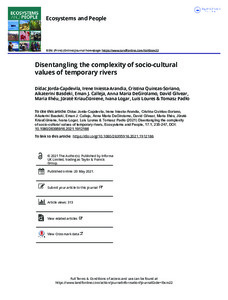Disentangling the complexity of socio-cultural values of temporary rivers
| dc.date.accessioned | 2021-06-29T10:19:10Z | |
| dc.date.available | 2021-06-29T10:19:10Z | |
| dc.date.issued | 2021-05-20 | |
| dc.identifier | doi:10.17170/kobra-202106294175 | |
| dc.identifier.uri | http://hdl.handle.net/123456789/12948 | |
| dc.description.sponsorship | Gefördert durch den Publikationsfonds der Universität Kassel | |
| dc.language.iso | eng | |
| dc.rights | Namensnennung 4.0 International | * |
| dc.rights.uri | http://creativecommons.org/licenses/by/4.0/ | * |
| dc.subject | Ecosystem services | eng |
| dc.subject | ephemeral streams | eng |
| dc.subject | intermittent rivers | eng |
| dc.subject | non-monetary valuation | eng |
| dc.subject | participatory approach | eng |
| dc.subject | socio-cultural valuation | eng |
| dc.subject | temporal variability | eng |
| dc.subject | water management | eng |
| dc.subject.ddc | 300 | |
| dc.subject.ddc | 333 | |
| dc.title | Disentangling the complexity of socio-cultural values of temporary rivers | eng |
| dc.type | Aufsatz | |
| dcterms.abstract | In the last decade, an awareness towards temporary rivers has increased globally in response to drying climates and growing human demand for water. However, social perceptions of temporary rivers have rarely been incorporated in their science and management. In this study, we advance an understanding of the socio-cultural values of temporary rivers principally in a European context. We used an ecosystem services-based approach for a participatory and deliberative exercise with 16 researchers and managers. Our results point out to two important aspects of socio-cultural values in temporary rivers. First, cultural ecosystem services have high socio-cultural values and usually represent the interests of the less influential stakeholders in related conflicts. And second, the temporal and geographical variability of these types of rivers is key to understand their socio-cultural values. As an example, the low provision of freshwater in a long non-flowing phase is one of the reasons for its high value. The results above point to future research needs that deserve more attention like the study of tradeoffs and synergies of ecosystem services and interdisciplinary research and management. We finally acknowledge the need to conduct case study research to account for geographical variation and to include the multiple views of different stakeholder groups. | eng |
| dcterms.accessRights | open access | |
| dcterms.creator | Jorda-Capdevila, Didac | |
| dcterms.creator | Iniesta-Arandia, Irene | |
| dcterms.creator | Quintas-Soriano, Cristina | |
| dcterms.creator | Basdeki, Aikaterini | |
| dcterms.creator | Calleja, Eman J. | |
| dcterms.creator | DeGirolamo, Anna Maria | |
| dcterms.creator | Gilvear, David | |
| dcterms.creator | Ilhéu, Maria | |
| dcterms.creator | Kriaučiūniene, Jūratė | |
| dcterms.creator | Logar, Ivana | |
| dcterms.creator | Loures, Luis | |
| dcterms.creator | Padło, Tomasz | |
| dc.relation.doi | doi:10.080/26395916.1912186 | |
| dc.subject.swd | Wasserwirtschaft | ger |
| dc.subject.swd | Ökosystemdienstleistung | ger |
| dc.subject.swd | Umweltökonomie | ger |
| dc.subject.swd | Leistung | ger |
| dc.subject.swd | Bewertung | ger |
| dc.subject.swd | Soziologie | ger |
| dc.subject.swd | Fluss | ger |
| dc.type.version | publishedVersion | |
| dcterms.source.identifier | issn:2639-5916 | |
| dcterms.source.issue | No. 1 | |
| dcterms.source.journal | Ecosystems and people | eng |
| dcterms.source.pageinfo | 235-247 | |
| dcterms.source.volume | Vol. 17 | |
| kup.iskup | false |
Dateien zu dieser Ressource
Das Dokument erscheint in:
-
Artikel [1186]


